Iran To Tax Instagram Bloggers, Celebrities

While the Islamic Republic has banned access to Instagram, the country’s tax organization says it is going to tax Instagram bloggers and celebrities.

While the Islamic Republic has banned access to Instagram, the country’s tax organization says it is going to tax Instagram bloggers and celebrities.
According to Iran’s National Tax Administration, it has spotted 555 bloggers, among whom, 123 have a total income of 23,000 billion rials (over 45 million dollars). It is likely the influencers are using the platform under a VPN since the networks have been blocked by the regime.
In an interview with state affiliated ISNA, Mehdi Mowahed, the Spokesperson of the Tax Administration said "these people have income and should pay taxes for it." It is normal practice globally for bloggers and influencers to pay tax on income accordingly.
The tax administration has predicted that about 5,000 billion rials (10 million dollars) or more will be collected from Instagram influencers this year.
In March 2020, Iran’s parliament approved a law to collect taxes from users with more than 500,000 followers on social networks; a law that has many ambiguities regarding the way people are identified, the platform they work on, and many other things.
Last year, after the blocking of Instagram and WhatsApp, the Ministry of Communications announced a support plan for tax exemption for active users on platforms approved by the regime like Rubika, and iGap.
Despite large investment in domestic platforms, these services could not win the trust of ordinary citizens.
Experts have warned that domestic apps are very vulnerable to government intrusion and there are serious safety and privacy concerns including the fear that security services could be able to spy on people through them.

A senior Republican lawmaker slammed as "absolutely unacceptable" a State Department response about why the US Iran envoy’s security clearance was under review.
Michael McCaul (R-TX), chairman of the House of Representatives committee on foreign affairs, wrote to Secretary of State Antony Blinken on June 30 seeking "a full and transparent accounting" about why Malley was suspended and was under investigation.
Malley’s suspension was first reported by Iran International June 29, and formally announced the following day by Matthew Miller, the spokesperson for the US State Department, calling it "a leave of absence”, adding that his duties would be temporarily assumed by his deputy, Abram Paley. However, it is believed he had been suspended as early as April.
Speaking on condition of anonymity, a US official said Malley was put on unpaid leave on June 29 after news broke that his security clearance was under review.
In a response made public by McCaul's office, Naz Durakoglu the assistant secretary of state for legislative affairs, said the agency had a "thorough and comprehensive process" to assess an individual's eligibility to access classified information.
"Consistent with longstanding Executive Branch and Department of State policies and practices, the Department is not in a position to provide further documents or information related to this personnel-security clearance matter," she said.
McCaul, in a brief statement, said: "This is an absolutely unacceptable response."
"Congress deserves to know exactly why the US Special Envoy (for) Iran had his security clearance suspended, was then suspended from his position, and now, according to news reports, is being investigated by the FBI," McCaul added, saying he would ask the agency for a classified briefing next week.
Former State Department Advisor on Iran Gabriel Noronha tweeted that the administration failed to clarify the nature of Malley’s security infractions and “they contemptuously refer Congress to the Foreign Affairs Manual.”

When news that his security clearance was under review broke on June 29, Malley said: "I have been informed that my security clearance is under review. I have not been provided any further information, but I expect the investigation to be resolved favorably and soon. In the meantime, I am on leave."
In a regular briefing on Tuesday, State Department spokesman Matt Miller said Malley "stopped performing the duties" of special envoy for Iran on June 29 and "went on leave "several weeks before that," but he declined to provide further details.
In fact, Malley was absent from a Congressional briefing in May, when the State Department said he could not attend because of a family health emergency.
Three other Republican senators spoke with Iran International on Tuesday, criticizing the Biden administration for its Iran policy and Malley’s security investigation.
Appointed soon after Democratic President Joe Biden took office in 2021, Malley had the task of trying to revive the 2015 Iran nuclear deal. Then-President Donald Trump, a Republican, had abandoned the pact in 2018 and reimposed U.S. sanctions on Iran.
But Iranians opposed to the Islamic Republic never trusted Malley, who they believed was inclined not to be tough with the regime and played down popular sentiments to replace the clerical regime with a secular and democratic government. Some US lawmakers have also hinted that they share the distrust.
Having failed to revive the deal, the United States has held talks with Iran to try to ease tensions by sketching out steps that could limit the Iranian nuclear program, release some detained U.S. citizens and unfreeze some Iranian assets abroad, Iranian and Western officials said in June.
With reporting by Reuters
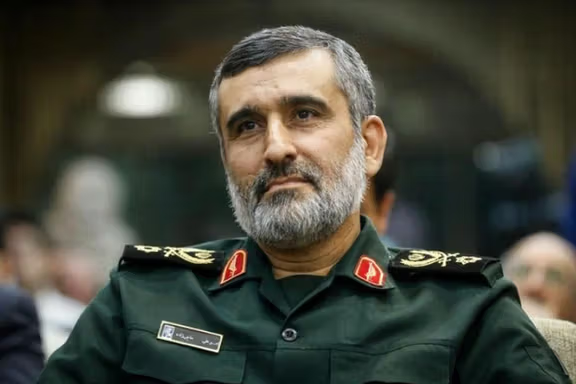
The IRGC Aerospace Commander has said that some Iranians "use the country's resources" and then go to NASA or participate in the "mischievous" Starlink project.
Amir Ali Hajizadeh accused the Iranian employees of the Starlink of "not having a goal" and unable recognize “friends and foes" adding that these people "serve the enemy".
NASA or the National Aeronautics and Space Administration is an independent agency of the US federal government responsible for the civil space program, aeronautics research, and space research. Currently it is pursuing various projects, the most important of which is "Artemis" that seeks to return humans to the moon.
Starlink is a satellite system operated by SpaceX to provide satellite internet services and is managed by Elon Musk, an American entrepreneur and billionaire.
In his statements, the IRGC Aerospace Commander did not provide information about the number of Iranians working for NASA or Starlink, but it seems that his criticism is in response to the possible lack of specialist personnel in the IRGC and the large-scale migration of elites from Iran.
In recent years, the Islamic Republic of Iran has launched extensive security and judicial actions against the country's elites and academics who prefer to emigrate amid dire economic situation.
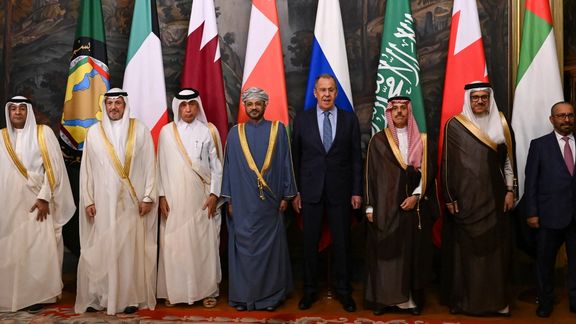
Tehran has upheld its sovereignty over three Persian Gulf islands after Russia and the Persian Gulf Cooperation Council (GCC) once again disputed Iran's rights.
In a joint Russia-GCC statement at the sixth joint ministerial meeting of the strategic dialogue between the Persian Gulf Cooperation Council (GCC) and the Russian Federation, held in Moscow on Monday, ministers affirmed their support for the United Arab Emirates which also claims sovereignty over the islands.
A statement called for "bilateral negotiations or the International Court of Justice, in accordance with the rules of international law and the United Nations Charter, to resolve this issue is in accordance with international legitimacy".
However, Iran's foreign ministry spokesperson Nasser Kanaani, on Tuesday rejected the contents of the statement about the three islands and said they “eternally belong to Iran and such statements are inconsistent with Iran’s friendly relations with its neighbors,” referring to the detente between the Iran with its neighbors the UAE and Saudi Arabia.
The first meeting of the Russia-GCC strategic dialogue was held in the Saudi capital in 2017 but Moscow’s inclination towards the Arab countries has been on the rise in recent years, especially after the Russian invasion of Ukraine. However, the allegiance on the contentious matter of the islands with the UAE, will be a blow to Tehran which since the war in Ukraine has forged a growing alliance with Moscow.
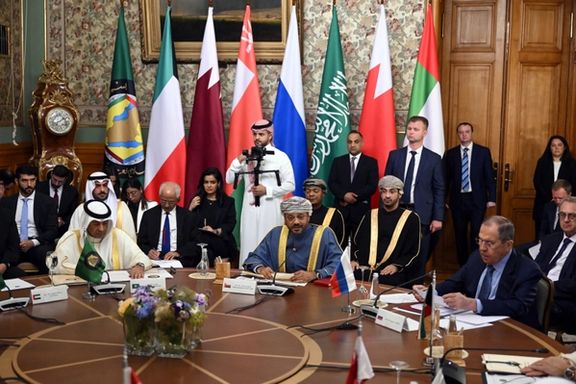
The three Persian Gulf islands have historically been part of Iran, proof of which can be corroborated by historical and geographical documents. However, the United Arab Emirates has repeatedly laid claim to the islands, describing the situation as “the continued occupation by the Islamic Republic of Iran.”
The three islands fell under British control in 1921 but on November 30, 1971, a day after British forces left the region and just two days before the UAE was to become an official federation, Mohammad Reza Shah sent the Iranian navy to secure all three. Iranian forces remain on the islands, with only Abu Musa having a civilian population which is less than two thousand.
The GCC - a regional organization bringing together six countries of Bahrain, Qatar, Kuwait, the United Arab Emirates, Oman and Saudi Arabia - repeatedly expresses support for “the right of the State of the UAE to regain sovereignty over her three islands and over the territorial waters, the airspace, the continental shelf, and the economic zone of the three islands, as they are an integral part of the State of the United Arab Emirates.”
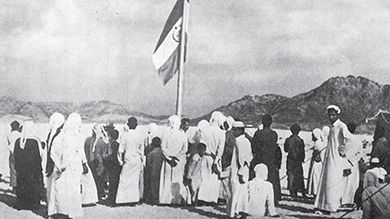
Urging the Islamic Republic of Iran to respond to the efforts of the UAE and the international community in solving the issue by peaceful means or taking recourse to the International Court of Justice, the GCC demands “that Iran abide by the basic pillars of promoting good neighborly ties, mutual respect, and non-interference in the internal affairs.”
In the statement issued at the end of the summit in Moscow, the Russian and GCC ministers also welcomed the agreement between Saudi Arabia and the Islamic Republic on the efforts and mediation of Oman, Iraq and China. They also expressed hope that this agreement would constitute a positive step to resolve differences and end all regional disputes through dialogue and diplomatic means.
Russian Foreign Minister Sergey Lavrov, who hosted his Arab counterparts from the Persian Gulf, also welcomed the recent rapprochement, saying that “this creates a more positive atmosphere in this region."
The GCC countries have kept warm relations with Russia after its invasion of Ukraine, despite their claims that they support the international community’s view about the war.
“Our position on the Russian-Ukrainian crisis is based on the principles of international law and the UN Charter,” Al Budaiwi said during an address to the meeting on Monday.
In March, Saudi Foreign Minister Prince Faisal bin Farhan said on a visit to Moscow that Riyadh was ready to mediate in the Russia-Ukraine conflict. Saudi Arabia has also strengthened its relationship with Kyiv, sending significant amounts of humanitarian aid, as well as mediating between Russia, the US and Ukraine on prisoner exchanges.
According to an analysis by the Carnegie Endowment for International Peace think tank, many Arabic media platforms adopt a narrative that justifies the Russian invasion with reference to Russia’s right to defend its national security. It portrays the narrative that Ukraine is a Western puppet that initiated hostilities and threatened Russia.
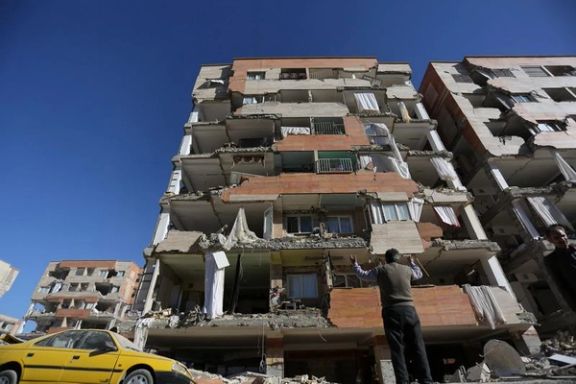
A magnitude 3.3 earthquake struck southeastern Tehran on Tuesday near Ghiamdasht county raising fears that the Iranian capital might be prone to stronger quakes.
Mehdi Zare, a faculty member of the International Research Institute of Seismology and Earthquake Engineering, told Roydad 24 that Tuesday’s earthquake near Eyvanki fault indicates that it is still active, causing minor quakes.
“This fault zone, whose northwestern end reaches the 15th district of Tehran, has an earthquake-generating capacity of up to magnitude 7.5,” he warned. At least one and a half million people would die in case of an earthquake with a magnitude of 7 in Tehran, say experts.
The Tuesday morning quake was about 20 km southwest of Tehran and at a depth of 10 km (6.21 miles), the Volcano Discovery said.
Iran is crisscrossed by major geological fault lines and is one of the most earthquake-prone countries in the world because it is located where the Arabian, Indian, and Eurasian tectonic plates meet.
Iran has a history of massive earthquakes in recent decades, with some killing up to tens of thousands of people and causing billions of dollars in damages, such as the magnitude 6.6 quake in Kerman province in 2003 that killed 31,000 and flattened the ancient city of Bam.
Iranian officials have warned that there are 166,000 hectares of worn-out structures across the country which means a major earthquake like in Turkey and Syria could result in “hundreds of thousands of deaths.”
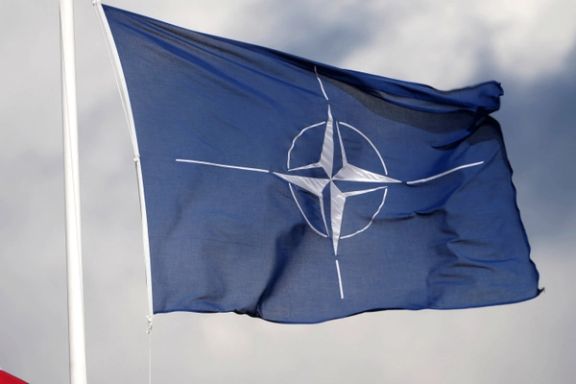
NATO allies expressed serious concern over Iran's "malicious activities" within their territory and called on Tehran to stop its military support to Russia, including the supply of drones.
"We call upon Iran to cease its military support to Russia, in particular its transfer of Uncrewed Aerial Vehicles (UAVs) which have been used to attack critical infrastructure, causing widespread civilian casualties," the 31-member alliance said in a final declaration at a summit in Lithuania.
"We express our serious concern over Iran’s malicious activities within Allied territory."
The United States and Britain have accused Iran of numerous terror plots on their soil. Last November, Iran International TV moved its broadcast operation to Washington DC after the British police found credible information that Iranian agents were plotting to harm its journalists.
Iran has also supplied hundreds of kamikaze drones to Russia since mid-2022 that have been used against civilian and military targets since early October last year. NATO countries had to beef up Ukraine’s air defenses partly because of the Iranian Shahed drones that are cheap and used in swarms by Russia to overwhelm air defenses.
The latest such attack occurred in the early hours of Tuesday, July 11, when Russia launched 29 attack drones mostly against the capital Kyiv. Ukraine’s military said it shot down all the drones, but this results in precious anti air missiles to be used, which are needed against missiles and for military operations.